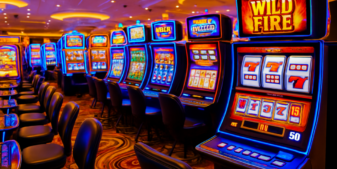A study has shown that increased exposure to blue light can make gamblers less sensitive to losses, and therefore increase risk-taking behavior.
The paper, published in Nature’s Scientific Reports set out to discover how light affects gambling behavior. The researchers wanted to discover how the type of light changes gamblers’ fear of losing money when taking risks.
The study compared blue light with warmer, yellowish light and found that players were willing to take more risks when exposed to blue light.
The “blue light” group showed about 23% less loss aversion than the warm light group. This means they were less afraid of losing money and were more willing to take risks.
Does the reward outweigh the risk?
In the study, participants were shown a series of betting options, such as:
Would you take this gamble?
-
If you win: you get $10
-
If you lose: you lose $5
It was found that the blue light group only needed the gain to be 24% more than the potential loss. The yellow light group required at least a 60% difference before they were willing to accept the bet.
The study also found that men were much more willing to risk losing than women. This is in line with gambling statistics that indicate more men gamble than women. In a survey, 75% of men reported gambling in the past year compared to 60% of women. About two-thirds of problem gamblers are also men, and males are more likely to chase losses than women.
Professor Sean Cain, a co-author of the paper, suggested practical applications: “It is possible that simply dimming the ‘blue’ in casino lights could help promote safer gambling behaviours.”
It is no coincidence that casinos are brightly lit at any time of the day, and the designers may have been well aware of how light affects gambling when setting the dimmer switch.
While it is unlikely that Vegas casinos will suddenly dim the lights as a result of the findings, online casino players could use the results to turn off the blue light on their devices. This may lead to more cautious gambling behavior and reduce heavy losing streaks.
Other factors that increase risky gambling
Other studies have found that blinking lights and loud noises can increase risk-taking behavior. This is in line with the design of slot machines that feature a series of flashing lights and bombard players with loud noises.
It is also no coincidence that casinos, as well as being brightly lit, also create a lively atmosphere full of flashing lights, loud sounds, and reinforce this when players hit a jackpot. Surrounding players with excitement elevates their mood, which makes individuals less concerned about potential losses and more focused on the possibility of winning.
Other research has found that gamblers overestimate their ability to control the game, and near misses give bettors the false belief that they are close to a win.
The famous gambler’s fallacy also shows that players betting on games of chance believe previous results will influence future outcomes. For example, if a roulette wheel spins black five times in a row, then there is an increased chance that the next spin will be red.
Professional gambler Jeff Whitelaw, inducted into the betting half of fame last week, advised bettors never to chase losses and go against public opinion to maximize winnings. Players may also be well-advised to be aware of the lighting as well the next time they go to make a big bet.

